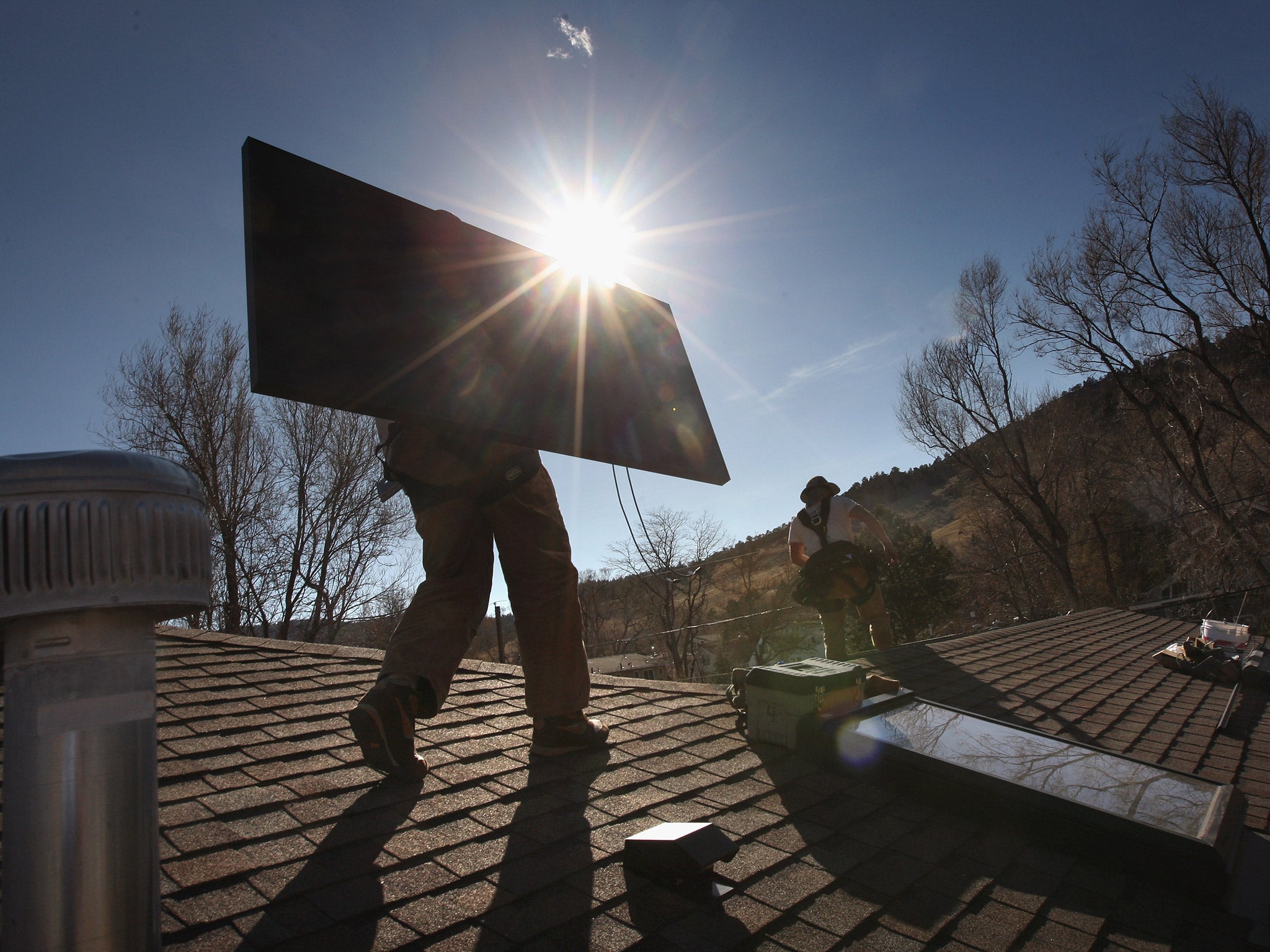Ministers preparing to slash subsidies paid to households which install solar panels
The move is an attempt to rein in runaway spending on renewable energy schemes

Your support helps us to tell the story
From reproductive rights to climate change to Big Tech, The Independent is on the ground when the story is developing. Whether it's investigating the financials of Elon Musk's pro-Trump PAC or producing our latest documentary, 'The A Word', which shines a light on the American women fighting for reproductive rights, we know how important it is to parse out the facts from the messaging.
At such a critical moment in US history, we need reporters on the ground. Your donation allows us to keep sending journalists to speak to both sides of the story.
The Independent is trusted by Americans across the entire political spectrum. And unlike many other quality news outlets, we choose not to lock Americans out of our reporting and analysis with paywalls. We believe quality journalism should be available to everyone, paid for by those who can afford it.
Your support makes all the difference.Ministers are preparing to slash the subsidies paid to households which install solar panels on their roofs in an attempt to rein in runaway spending on renewable energy schemes.
Under the current rules households can make between £610 to £740 a year by “selling” the electricity they generate back to the national grid.
Thousands of people have taken advantage of the scheme but the high uptake has contributed to a £1.5bn projected overspend in renewable subsidies which has to be funded through levies which result in higher energy bills for other consumers.
The Energy and Climate Change Secretary Amber Rudd called time on the subsidies and announced that the Government would review the scheme for new adopters later this year in a move that is expected to slash the support available.
The decision comes less than a week after The Independent revealed the scale of the “black hole” in renewable funding which is expected to add £110 to average household electricity bills by 2020.
However the new move will not directly reduce bills, merely ensure they don’t rise faster than currently anticipated. A source in the Department of Energy and Climate Change said further cuts in subsidies were likely in the coming months to achieve this. This though could put the Government’s carbon emissions target in jeopardy if it results in investors pulling out of renewable energy projects.
Announcing the changes Ms Rudd said she was attempting to reduce emissions “in the most cost-effective way”.
“Our support has driven down the cost of renewable energy significantly. As costs continue to fall it becomes easier for parts of the renewables industry to survive without subsidy,” she said.
“We’re taking action to protect consumers, while protecting existing investment.”
But critics said the proposals would put jobs at risk and undermine investment in renewables, while failing to reduce people’s energy bills.
Daisy Sands, head of the energy campaign at Greenpeace, claimed the move was “a hugely short-sighted proposal that will wipe out innovative community solar-energy schemes”.
“If the Government is serious about keeping energy bills down, they would choose to slash subsidies and tax breaks for the oil, gas and nuclear corporations,” she said.
The Friends of the Earth energy campaigner Alasdair Cameron added that it represented the “latest attack on the green economy” that would undermine efforts to tackle climate change.
“This won’t lower electricity bills – all new energy is being subsidised to some extent, and solar is already cheaper than nuclear and will soon be cheaper than gas from new power stations,” he said.
The Solar Trade Association (STA) claimed the move would hit large rooftop schemes, which the Government has been keen to back, as well as solar farms. “We also regret this move because solar farms are close to competitiveness with new gas generation,” said the STA’s head of external affairs Leonie Greene.
However, in an attempt to sugar the pill the Government also announced plans to extend the cap on subsidies past the current end date of 2020-21 to give investors more certainty about future subsidies. The framework puts a cap on the total amount of subsidies that can be paid to renewable energy schemes out of consumer bills.
Lobbying rules: Rudd links revealed
The Energy Secretary Amber Rudd has failed to comply with new rules requiring MPs to disclose their links to lobbyists in official parliamentary records.
Under regulations brought in after the election, all MPs must disclose close family members engaged in lobbying the public sector.
But the website Total Politics found that Ms Rudd had failed to declare that her brother, Roland Rudd, was the head of the financial lobbying firm Finsbury.
A source close to the Energy Secretary acknowledged that it was an “oversight” that would be corrected.
Subscribe to Independent Premium to bookmark this article
Want to bookmark your favourite articles and stories to read or reference later? Start your Independent Premium subscription today.
Join our commenting forum
Join thought-provoking conversations, follow other Independent readers and see their replies
Comments